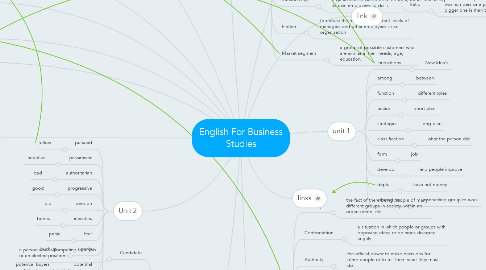
1. Unit 2
1.1. pursued
1.1.1. follow
1.2. pessimistic
1.2.1. negative
1.3. authoritarian
1.3.1. bad
1.4. progressive
1.4.1. good
1.5. pension
1.5.1. old
1.6. incenties
1.6.1. bones
1.7. fear
1.7.1. panic
1.8. perks
1.8.1. buck up
1.9. potential
1.9.1. potential buyers
1.10. esteem
1.10.1. drop in public
2. unit 3
2.1. task
2.1.1. job
2.2. segment
2.2.1. part
2.3. Eliminate
2.3.1. to completely remove something that is not wanted or needed.
2.4. Split
2.4.1. to divide or cause to divide into two or more parts
2.5. Merger
2.5.1. a situation when two or more companies, organizations, departments, etc. join together.
2.6. Takeover
2.6.1. the act of taking control of a company by buying enough of its shares to do this
2.7. Recession
2.7.1. a period, usually at least six months, of low economic activity, when investments lose value, businesses fail, and unemployment rises.
2.8. Outsourcing
2.8.1. a situation in which a company employs another organization to do some of its work, rather than using its own employees to do it.
2.9. Flatten
2.9.1. to reduce the number of different levels of managers and other employees in an organization
2.10. Market segment
2.10.1. a group of possible customers who are similar in their needs, age, education.
3. Unit 5
3.1. Candidate
3.1.1. a person who is competing for a job or an elected position.
3.2. covering letter
3.2.1. a letter that contains information about the thing it is sent with.
3.3. Headhunters
3.3.1. a person who is hired by a company to find someone who has the qualifications for an important job and is willing to leave their present job
3.4. Human Resources
3.4.1. a person who in charge of the department that deals with the employment, training, support, records, etc.
3.5. Junior
3.5.1. used to describe someone of a low rank, or of a lower rank in relation to others, in an organization
3.6. Recruiters
3.6.1. a company or organization that is looking for new employees.
3.7. Referee
3.7.1. a person who knows you and who is willing to describe your character and abilities in order to support you when you are trying to get a job.
3.8. Weaknesses
3.8.1. a situation in which someone or something is at a low level or is not strong or successful
3.9. Vacancy
3.9.1. a job that is available in an organization and that people can apply for
3.10. curriculum vitae
3.10.1. a short written description of your education, qualifications, previous jobs, and sometimes also your personal interests, which you send to an employer when you are trying to get a job.
4. marketing
5. management
6. software apps
7. maths
8. link
9. links
10. unit 1
10.1. Innovations
10.1.1. New Idea's
10.2. among
10.2.1. between
10.3. function
10.3.1. different roles
10.4. tactics
10.4.1. short plan
10.5. strategies
10.5.1. long plan
10.6. classification
10.6.1. what the person did
10.7. form
10.7.1. job
10.8. develop
10.8.1. help people improve
10.9. depts
10.9.1. have not money
10.10. integrating
10.10.1. connecting group to work
11. Unit 4
11.1. Diversity
11.1.1. the fact of there being people of many different groups in society, within an organization, etc..
11.2. Confrontation
11.2.1. a situation in which people or groups with opposing ideas or opinions disagree angrily.
11.3. Authority
11.3.1. the official power to make decisions for other people or to tell them what they must do.
11.4. Collectivist
11.4.1. having a political system based on the principle of collectivism, or relating to the theory of collectivism.
11.5. Glocalization
11.5.1. the idea that local conditions must be considered in globalization (= trading in all parts of the world).
11.6. Hierarchy
11.6.1. a system in which the people within a company or organization are organized into levels according to the authority they have.
11.7. Multinational
11.7.1. a very large company that has offices, stores, etc. in many different countries but that is controlled from the country where it was started.
11.8. Foreign market
11.8.1. a financial market in which foreign currencies are bought and sold.
11.9. Individualist
11.9.1. someone who is different or original
11.10. Stereotype
11.10.1. a fixed idea that people have about what someone or something is like, especially an idea that is wrong.
12. Unit 6
12.1. Accountability
12.1.1. a situation in which someone is responsible for things that happen and can give a satisfactory reason for them.
12.2. Apprentice
12.2.1. someone who works for an employer for an agreed period of time in order to learn a new skill, often for a low wage.
12.3. critical mass
12.3.1. the size or number that something needs to reach before a particular change or development can happen.
12.4. Compulsory
12.4.1. if something is compulsory, you must do it because of a law or rule.
12.5. Equality
12.5.1. a situation in which men and women, people of different races, religions, etc. are all treated fairly and have the same opportunities.
12.6. Gender
12.6.1. the condition of being either male or female
12.7. ethnic minorities
12.7.1. a group of people with a particular race or nationality living in a country or area where most people are from a different race or nationality
12.8. Prejudice
12.8.1. an unreasonable opinion, especially about a particular group of people, that is formed without thought or knowledge.
12.9. Quota
12.9.1. a fixed limit on the amount of something that someone is allowed to have or is expected to do
12.10. Ratio
12.10.1. the relationship between two amounts, represented by two numbers or a percentage, expressing how much bigger one is than the other

